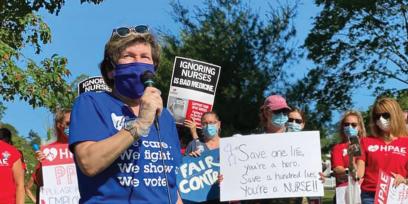AT THE AFT, we have a saying: we care, we fight, we show up, and we vote. Our goal: turn aspirations for a better life into reality. And frankly, working people can only do that when we work together in solidarity.
How? Whether striking for safe staffing, negotiating decent wages and retention policies, or electing leaders who prioritize accessible, affordable healthcare, we fight for solutions to the problems that keep you up at night. But because hospital management often puts profits over patients and clinicians, healthcare is full of keep-you-up-at-night issues.
In this AFT Health Care, Bill Garrity, the president of University Health Professionals in Connecticut and an emergency department nurse, explains that one of his members recently worked an 18.5-hour shift. That’s deplorable—and dangerous. Nurses and other health professionals are routinely forced to work overtime with high patient loads; as exhaustion sets in, they fear for their patients’ safety. “Many of our members just cannot handle it anymore. I have actually had suicide prevention talks with my own members,” Garrity says.
Stephanie Gapper, a registered nurse and member of the Oregon Nurses Association, warned her family and friends to stay out of the hospital during COVID-19. Patients were being treated in hallways, while experienced nurses who felt devalued and overwhelmed walked out the door.
These are issues for everyone—not just hospital staff. And our union confronts these issues head-on.
We are in a moment like no other. The global pandemic should have unified the country in fighting the virus, but instead our political environment is as toxic as I have ever seen, with extremists preying on anxieties to stoke divisions.
Our movement, the labor movement, helps confront this uncertainty and anger. The labor movement offers a pathway to dignity, respect, and being able to sleep at night—having a secure job with good wages and benefits, a reasonable workload, and voice at work. This path creates opportunities to build a better future, particularly for the next generation.
In healthcare, this pathway begins with solving the staffing crisis. The AFT Healthcare Task Force, which I convened in January, is bringing together AFT leaders, representing the voices of rank-and-file members, and the nation’s top healthcare researchers. Later this spring, they will make recommendations on recruitment and compensation, with an emphasis on increasing diversity, career retention and advancement, and trust and voice in the workplace. That means a focus on salaries, working conditions, and staffing levels, including safety concerns and resources, and confronting industry trends that are undermining healthcare workers’ jobs.
The healthcare work you do is essential. So is your union work—creating communities, building power, and setting an agenda of fairness, opportunity, and justice for working people. Our country is at a crossroads; our union movement is a vital force in moving from anger to aspiration, from fear to hope.
We are, collectively, perhaps the best vehicle for everyday folks to improve their lives. That happens at the bargaining table, but it also happens at the ballot box. It happens when we take the last-resort step to go on strike for the resources to do our jobs safely. It happens with the new organizing at Amazon, Planned Parenthood, and Starbucks, and also with legislative victories.
But let’s not kid ourselves. Corporate and other wealthy elites—including hospital CEOs and investors—have spent the last four decades waging war on working people. I believe in capitalism, but capitalism works better when there’s a check on that power—when the people doing the work have a say in who benefits, rather than this obeisance to the market, which is why gas prices, prescription drug costs, and insurance rates are sky high.
Let’s rewrite the economic rules so we have a system that rewards work, not wealth.
That’s part of what unions do—turning our aspirations into reality—and Americans see that value. The Gallup approval rating for unions is nearly 70 percent, the highest in six decades. We are there, shoulder to shoulder, in hospital break rooms, in churches and synagogues and mosques, in community centers, and on factory floors.
When we connect with people on the issues that matter, the things that create the freedom to thrive, we build a better life for ourselves, our families, our patients, and the next generation, too. That’s what unions do.

